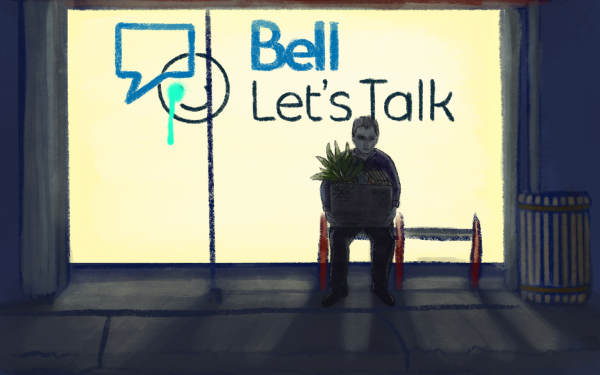Bell, Let’s Talk
Destigmatizing Does Nothing Without Action
Names have been changed in order to protect the identities of the people involved, upon their request(s).
“I know that [Bell Let’s Talk] is about talking about mental health, but we need to talk about more than what it feels like to have a mental illness,” said Kendra, a former customer service representative at Bell.
“We have to talk about employers having mental health care. The discussion is a lot more than just, ‘I’m depressed.’”
In November 2019, Kendra worked at a Bell store in Montreal as a customer service representative.
She lasted only three weeks.
Today, Bell launched their ninth incarnation of its nationwide mental health awareness campaign, Bell Let’s Talk.
The $50 million awareness program was inaugurated in 2010 as a five-year ad campaign to encourage discussion around mental illness, according to their website.
As the single largest corporate commitment to mental health in Canada, the Bell Let’s Talk campaign states that it aims to “create a stigma-free Canada and drive action in mental health care, research, and the workplace.”
The campaign donates $0.05 for different user activity across various social media platforms to accredited mental health initiatives in Canada.
“Whether you’re improving the way society cares for people with mental illness, or just taking time to care for your own mental health,” their Youtube ad explains, “when it comes to mental health, every action counts.”
Without doubt, the campaign is a step in the right direction.
But inside the doors of the Bell corporation, the truth unravels.
High-pressure jobs, impossible expectations, and a virtually non-existent mental health care plan reveal a harsher truth: Bell is just another giant media corporation capitalizing on a solitary hashtag.
—-
In fall 2018, Sarah left her job at Bell for good.
From a sales representative at the company’s offshoot brand, Virgin Mobile, to a customer service manager, to eventually securing a contract as a recruiter at another Bell offshoot brand, she’d been working with the company on and off for three years.
Dealing with chronic depression for the majority of her life, Sarah has learned on her own how to keep her mental health intact.
“I’ve had my mental health ups and downs for many years, which is something that I work on maintaining and improving on a daily basis,” Sarah said.
“But there are times when [I go through] an anxiety flare-up […], and I need more support, or less work,” she said.
In summer 2018, Sarah hit a particularly rough patch in her mental health.
She could handle the depression, but anxiety was a new symptom—one she was not equipped to handle on her own.
Struggling to maintain daily routines, she reached out to her team of health care professionals, including her general practitioner and a psychiatrist.
As per her doctors’ advice, she was put on sick leave—two weeks to start.
“From the first day, I felt like there was something off about the way [my managers at Bell] were handling it,” she said.
“They were calling me right away, like, ‘what happened? What’s wrong with you? What’s going on, why can’t you work?’”
The calls from her manager were unwarranted and intrusive.
“I knew right off the bat that [they] really shouldn’t be digging into those kinds of details unless [they]’re from HR and need to file something—short term disability or something like that,” Sarah said.
As her sick leave extended past its original two weeks, her manager’s once kind demeanour became more aggressive.
“At the time, because of what I was going through, I was very sensitive,” she explained.
“To have my managers, and my managers manager, calling me out of the blue to ask me why I couldn’t work felt very inappropriate. There was just no support, no offer of, ‘we have these services,’ or, ‘are you feeling okay?’”
“It seemed very investigative, like they were putting me under a spotlight; putting me on the spot to get the really personal details out me, which was really hard to deal with under the circumstances.”
“I know that it’s not a unique experience,” she added.
—
Antidepressant use in Canada is one of the highest in the world, according to a Huffington Post article from 2013, and another from a CBC blog post by a Dr. Goldman back in 2018.
Whether this is due to temperatures that often slip below zero in the isolated cold of winter months, the sun dipping below the horizon before five o’clock in December, or the onslaught of living in a capitalist society that rarely offers an escape, we may never know.
Regardless of the causes behind mental illness, one thing is for sure—once a year—Bell places itself front and center.
“We had regular communications about [the campaign] when it was coming up, and we were encouraged to participate and remind customers about it,” Sarah said.
“Everyone was aware of the campaign.”
This may come as a shock, but de-stigmatizing mental illness isn’t as easy as Bell makes it seem.
When the manager realized that Sarah’s ailment had more to do with mental health, her attitude soured, despite promoting Let’s Talk to employees annually.
“As someone who was worked on my own mental health for a long time, I’ve seen so many different reactions from people,” she said.
“So, sometimes—especially in the workplace—it’s almost not worth the risk of opening that up.”
“I think, originally, [my manager] had more sympathy because she thought it was a physical ailment,” said Sarah.
—-
While on the management team for Virgin Mobile in another province, Sarah single-handedly developed a mental health awareness training for her colleagues.
“I can speak for myself; as a store manager, there wasn’t much training,” she said.
“There was an optional online course that you could do as a manager, but none of it was mandatory.”
Looking out for the college-aged students employed at her store, Sarah “was afraid there would be red flags we would miss, especially in high season.”
While her presentation was shared amongst the regional managers, it didn’t garner much feedback.
“I think there’s an expectation of sales associates to just be like ‘go go go’, very high spirits—especially with the Virgin brand, which is supposed to be very cool and laid back,” she said.
“There really wasn’t a bad response, but there was no [real] response to it.”
Reports of sky-high expectations, excessive stress, and a lack of formal mental health care are not uncommon for Bell employees.
A 2017 article published by CBC News had over 600 current and former employees writing in to come forward about their unforgiving workplaces, discussing the irony of the Bell Let’s Talk campaign in comparison to the real-life working conditions of the company.
“To have my managers, and my managers manager, calling me out of the blue to ask me why I couldn’t work felt very inappropriate. There was just no support, no offer of, ‘we have these services,’ or, ‘are you feeling okay?’”- Sarah*
A breeding ground for mental health triggers
Despite Bell’s happy-go-lucky and maybe even inspiring campaign, the inner workings of the corporation are a stark contrast.
“In the contract, it said that mental or physical incapacity to do your job is grounds for termination,” said Kendra.
Kendra made minimum wage plus commission during her three-week stint with Bell.
The company expected her to make at least 100 per cent commission every week, she explained; anything less and she would be threatened with dismissal.
She was also expected to work unpaid, outside of office hours, selling products to friends, family, and even cold-calling customers to make commission.
There was a lot of learning material—two or three quizzes a week, she was expected to take during her shift, while she was busy serving customers and making sales.
“We were expected to not only give [our] 100 per cent,” she said. “We were expected to give 160 to 200 per cent if possible.”
Besides a few words of encouragement from her boss, Kendra was left basically on her own.
She received no support or guidance from higher-ups in her high-pressure position that demanded so much of her time and energy, both on and off the clock.
Like Sarah, her position is not uncommon.
The 2017 CBC article revealed the story of a woman with stomach ulcers, and another with panic attacks so bad she would throw up before her shift.
“If you were good at your job and you knew how to sell things, that commission sounds very, very sweet,” explained Kendra. “But the thing is, until you get there, there’s a lot of stress.”
Over the course of her three-week career at Bell, Kendra felt herself slowly falling into a worse mental space.
Unable to handle the stress, and lack of support from management, Kendra finally quit after an aggressive encounter with a customer left her in tears, having a full-blown panic attack in the back room.
Though Bell’s Let’s Talk campaign is helpful, it must be viewed in full frame.
“The talk around mental illness is a lot more about talking about our feelings. It’s a good initiative, but it takes the attention away from the actual issue,” said Kendra.
“Talking about your feelings is fine, but there’s no support system after that.”
While there’s a lot of good that comes from it, Sarah says it’s more of an external good as opposed to focussing it internally with their own employees.
Both women have moved on to different jobs in their field.
The company Sarah currently works at has a psychiatrist employees can book for an appointment at the office, “just for convenience’s sake,” she said.
They also offer a meditation club and weekly yoga classes, which she partakes in.
“In a couple weeks, [we have] a mindfulness course, a six-week course to teach people about stress management,” Sarah said.
“It’s like night and day.”

_900_444_90.jpg)



_600_375_90_s_c1.jpg)

